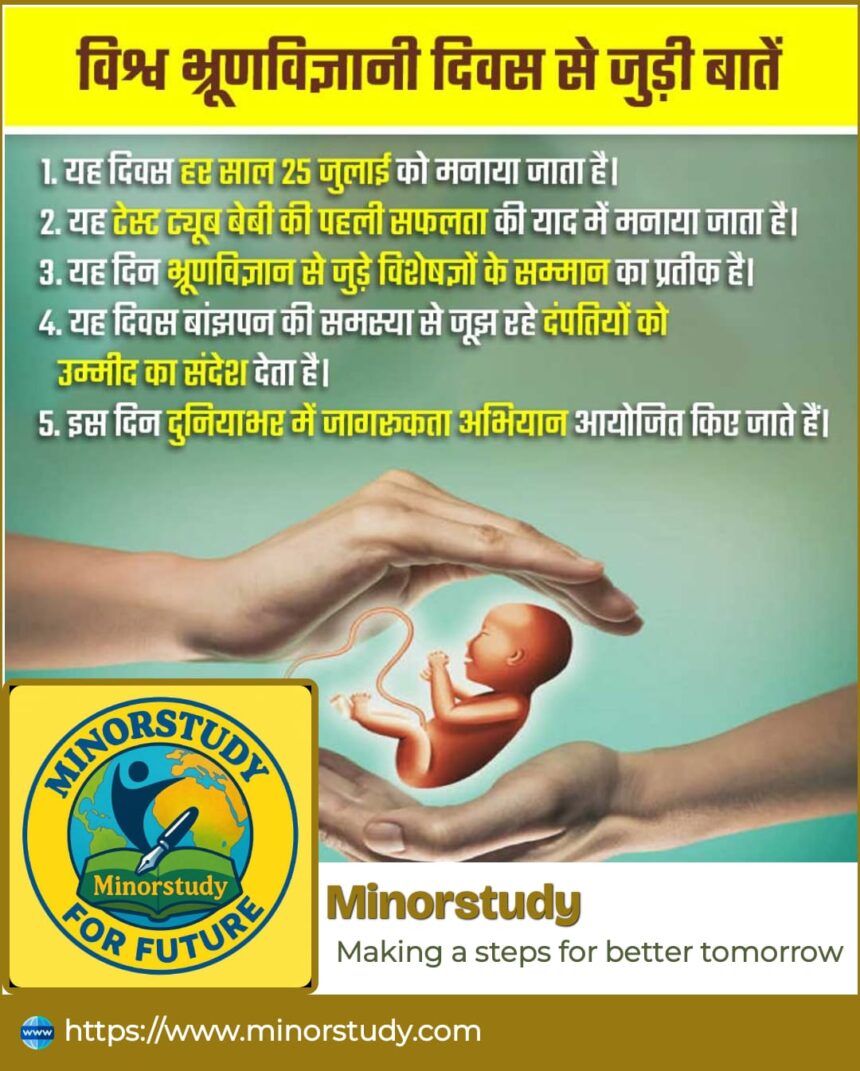🌍 Inspiring Facts That Make World Embryologist Day a Remarkable Milestone for Hope
Every year on 25 जुलाई (July 25), the world celebrates विश्व भ्रूणविज्ञानी दिवस (World Embryologist Day)—a date that stands as a symbol of science, hope, and human resilience. This day marks a scientific breakthrough that changed countless lives—the birth of the world’s first test tube baby, Louise Brown, on 25 July 1978 in England.
- 🧬 What is Embryology?
- 📜 History of World Embryologist Day
- 🧾 Timeline of Major Events in Embryology
- 📊 5 Inspiring Facts About World Embryologist Day
- ❓ FAQs about World Embryologist Day
- Q1: Why is 25 July celebrated as World Embryologist Day?
- Q2: Who are embryologists?
- Q3: Is IVF ethical and safe?
- Q4: What is the role of embryology in daily life?
- Q5: Can both men and women become embryologists?
- 🌱 Significance of World Embryologist Day
- 1. Scientific Innovation Meets Human Emotion
- 2. Destigmatizing Infertility
- 3. Educational Value
- 4. Policy and Regulation
- 5. Empowering Couples
- 🌍 Observance Around the Globe
- 💐 Wishing on World Embryologist Day
- 🧭 Importance in Our Life and Society
- ✅ 1. Bringing Joy to Millions
- ✅ 2. Breaking Social Stigmas
- ✅ 3. Encouraging Scientific Careers
- ✅ 4. Strengthening Healthcare Systems
- ✅ 5. Hope in Times of Declining Fertility
- 📝 Important Points to Remember
- 🏁 Conclusion: A Day of Quiet Miracles and Loud Gratitude
Since then, embryologists have quietly played a vital role behind the scenes in fulfilling the dream of parenthood for millions across the globe. This day is dedicated to honoring their efforts and raising awareness about infertility and reproductive health.
Let us explore the history, timeline, facts, FAQs, observances, significance, and daily life impact of this unique day in a human-centric and meaningful manner.
🧬 What is Embryology?
Embryology is the study of the development of an embryo from the fertilization of the ovum to the fetus stage. In the context of assisted reproductive technology (ART), embryologists are the key scientists working in IVF labs who handle gametes (sperm and eggs), fertilize them, culture embryos, and support implantation procedures.
📜 History of World Embryologist Day
The origin of this observance is directly tied to one of the greatest achievements in medical science.
🧪 Date: 25 July 1978
🍼 Event: Birth of Louise Brown, the world’s first IVF (In Vitro Fertilization) baby, in Oldham, England.
👨🔬 Scientists involved: Dr. Robert G. Edwards (a physiologist) and Dr. Patrick Steptoe (a gynecologist).
🌍 Global Impact: This event pioneered new possibilities for infertile couples and paved the way for the field of embryology.
It wasn’t just a scientific victory but a social revolution that challenged taboos around infertility, giving a new hope to childless couples worldwide.
🧾 Timeline of Major Events in Embryology
| Year | Milestone |
|---|---|
| 1978 | Birth of Louise Brown – First IVF baby. |
| 1981 | First IVF baby born in the U.S. |
| 1992 | ICSI (Intracytoplasmic Sperm Injection) developed for male infertility. |
| 2004 | Robert G. Edwards received Lasker Award. |
| 2010 | Dr. Edwards awarded Nobel Prize in Medicine. |
| 2023+ | IVF success rates climb, embryoscope and AI in embryology gain momentum. |
📊 5 Inspiring Facts About World Embryologist Day
Marks a Historical First in Human Reproduction:
Celebrates the day when human life was successfully created outside the body for the first time.Honors Unsung Heroes—Embryologists:
These behind-the-scenes scientists are often not recognized publicly, yet they help bring life into the world every day.Symbol of Hope for Infertile Couples:
With infertility rates increasing globally, this day reminds people that medical miracles are possible.Encourages Awareness on Reproductive Health:
Workshops, talks, and public awareness drives are held to reduce the stigma around infertility and promote scientific literacy.Promotes Global Collaboration in Science and Ethics:
The day also prompts discussions on bioethics, embryo freezing, surrogacy, and reproductive rights.
❓ FAQs about World Embryologist Day
Q1: Why is 25 July celebrated as World Embryologist Day?
A: It commemorates the birth of the first IVF baby, Louise Brown, on 25 July 1978—a major leap in reproductive science.
Q2: Who are embryologists?
A: They are trained reproductive biologists who fertilize eggs, culture embryos, monitor growth, and select the best embryo for transfer in IVF procedures.
Q3: Is IVF ethical and safe?
A: IVF is widely practiced under ethical guidelines. It’s safe when performed under proper medical supervision, though debates around embryo selection and surrogacy persist.
Q4: What is the role of embryology in daily life?
A: Embryologists silently transform lives by helping couples conceive, especially those facing issues like PCOS, male infertility, or unexplained infertility.
Q5: Can both men and women become embryologists?
A: Yes. Embryology is a science-driven field and open to both genders with a background in biotechnology, biology, or medical sciences.
🌱 Significance of World Embryologist Day
1. Scientific Innovation Meets Human Emotion
It blends the sharpest edge of science with the softest emotions of life—parenthood.
2. Destigmatizing Infertility
Infertility still carries stigma in many parts of the world. This day encourages open discussions and compassion.
3. Educational Value
World Embryologist Day spreads awareness about IVF, reproductive biology, and available treatments, especially in rural and developing regions.
4. Policy and Regulation
Helps focus attention on the need for ethical regulations, affordability, and better access to fertility services.
5. Empowering Couples
By understanding options like IVF, ICSI, surrogacy, and embryo freezing, couples feel more in control of their reproductive choices.
🌍 Observance Around the Globe
World Embryologist Day is primarily observed by:
IVF clinics and fertility hospitals
Medical colleges and universities
Health and science organizations
Infertility support groups
Public campaigns promoting reproductive rights
Common activities include:
Seminars on reproductive health
Public Q&A forums
Patient success stories
Free or subsidized infertility consultations
Honoring embryologists with awards or public thanks
💐 Wishing on World Embryologist Day
Let’s make our messages more compassionate and heart-touching:
🧡 “Happy World Embryologist Day! Thank you for turning dreams into families.”
🌟 “Saluting the hands that create life behind the scenes. Gratitude to all embryologists!”
🌱 “On this World Embryologist Day, let’s spread hope and love to couples still waiting for their miracle.”
👨🔬 “Here’s to the unsung heroes of hope—Happy Embryologist Day!”
🧭 Importance in Our Life and Society
✅ 1. Bringing Joy to Millions
Infertility can be emotionally devastating. Embryologists help fulfill the basic human longing for parenthood.
✅ 2. Breaking Social Stigmas
In many communities, infertility is wrongly blamed on women. This day promotes gender equality in reproductive discourse.
✅ 3. Encouraging Scientific Careers
It inspires young students—especially women—to explore STEM fields like embryology, genetics, and biotechnology.
✅ 4. Strengthening Healthcare Systems
Better understanding of embryology enhances maternal care, genetic disease prevention, and safer childbirth.
✅ 5. Hope in Times of Declining Fertility
With fertility declining due to urban stress, late marriages, and environmental factors, this day promotes awareness and solutions.
📝 Important Points to Remember
World Embryologist Day = Hope + Science + Humanity
Louise Brown = First IVF baby (born 25 July 1978)
Embryologists = Silent warriors in labs making life possible
IVF = In Vitro Fertilization (a method for assisted conception)
The day = A tribute, a reminder, and a global call for awareness
🏁 Conclusion: A Day of Quiet Miracles and Loud Gratitude
While the world celebrates doctors and nurses, embryologists remain mostly invisible, hidden behind microscopes and Petri dishes. But for every crying baby born through IVF, for every couple whose arms are no longer empty, their role is sacred.
World Embryologist Day is not just about science—it’s about faith in the unseen, gratitude for expertise, and spreading hope to the hopeless.
Let’s remember: Behind every test tube baby is a story of pain, patience, and a scientist who dared to bring life into the lab.
🧬 Happy World Embryologist Day to all the dream makers and miracle workers!








